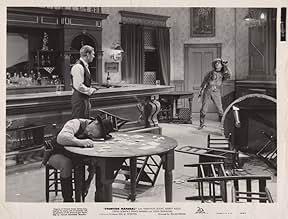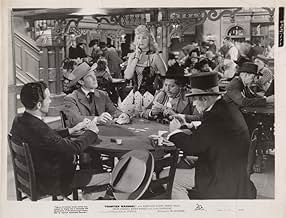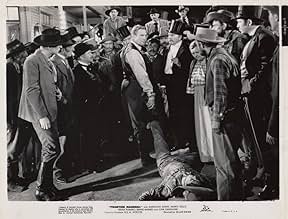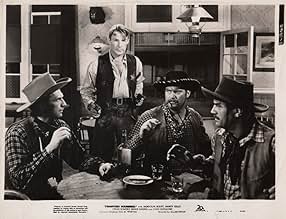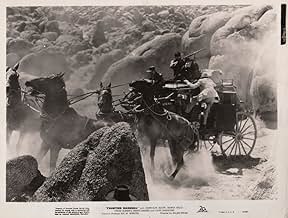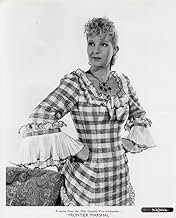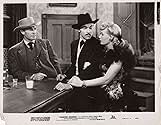AVALIAÇÃO DA IMDb
6,6/10
1,1 mil
SUA AVALIAÇÃO
Adicionar um enredo no seu idiomaWyatt Earp agrees to become marshal and establish order in Tombstone in this very romanticized version of the gunfight at the O.K. Corral.Wyatt Earp agrees to become marshal and establish order in Tombstone in this very romanticized version of the gunfight at the O.K. Corral.Wyatt Earp agrees to become marshal and establish order in Tombstone in this very romanticized version of the gunfight at the O.K. Corral.
- Prêmios
- 1 vitória no total
Dell Henderson
- Dave Hall
- (as Del Henderson)
Eddie Dunn
- Card Player
- (cenas deletadas)
- Direção
- Roteiristas
- Elenco e equipe completos
- Produção, bilheteria e muito mais no IMDbPro
Avaliações em destaque
Early version of the Earp-Holliday, OK Corral legend.
Thanks to big-budget TCF, this is a well-produced, mid-level Western. Those barroom scenes along with the crowded streets are high energy and appropriate to a boomtown, which Tombstone was. Dwan directs these scenes with flair. Can't say the same for the final shootout that is poorly staged and fleetingly done as if the production had to hurry up to meet schedule. Ford's 1946 remake My Darling Clementine greatly improves on that final showdown with the kind of close-ups and structured tension that're needed.
Scott and Romero cut formidable figures as the legendary heroes. The screenplay suffers, however, by failing to spotlight an equally formidable villain to challenge them, spreading the villainy instead across several minor players. Too bad the impressive Carradine is largely wasted in an incidental role. On the other hand, Kelly is very pretty as the good girl, while Barnes shines as the good-time girl. I like the way their rivalry evolves over time.
I can see why the estimable John Ford saw so much potential in the characters and story. There's a lot of color in the array of personalities and rivalries, including the show biz Eddie Foy Jr., an entertaining contrast to the frontier types. Of course, Ford's version is clearly superior. Still, this 1939 entry remains a respectable little Western with its own modest merits.
Thanks to big-budget TCF, this is a well-produced, mid-level Western. Those barroom scenes along with the crowded streets are high energy and appropriate to a boomtown, which Tombstone was. Dwan directs these scenes with flair. Can't say the same for the final shootout that is poorly staged and fleetingly done as if the production had to hurry up to meet schedule. Ford's 1946 remake My Darling Clementine greatly improves on that final showdown with the kind of close-ups and structured tension that're needed.
Scott and Romero cut formidable figures as the legendary heroes. The screenplay suffers, however, by failing to spotlight an equally formidable villain to challenge them, spreading the villainy instead across several minor players. Too bad the impressive Carradine is largely wasted in an incidental role. On the other hand, Kelly is very pretty as the good girl, while Barnes shines as the good-time girl. I like the way their rivalry evolves over time.
I can see why the estimable John Ford saw so much potential in the characters and story. There's a lot of color in the array of personalities and rivalries, including the show biz Eddie Foy Jr., an entertaining contrast to the frontier types. Of course, Ford's version is clearly superior. Still, this 1939 entry remains a respectable little Western with its own modest merits.
For seventy-one minutes the film manages to fit in the deteriorating security situation in Tombstone as the camera flashes to the street for all the shootouts and horseplay. Compared to My Darling Clementine, this one is more easy going. Cesar Romero captures best acting over Vic Mature in the role of Doc Holliday, IMHO if only because Mature's part seemed overwrought, and the part of Holliday seems to fit Romero in a decisively more real way. Even still, the script in Frontier Marshal still caricatures Holliday as overly emotional, especially in the scenes in the saloon where he's purposely drinking himself to death because ex-flame Nancy Kelly comes in on the stage. Still, Romero was a great actor, and his scenes with Randolph Scott as Earp are a nice mix of two actors who had real naturalness. The B&W photography (Charles Clarke) stands out throughout and all the scenes in this movie are well assembled. It is over before you know it.
What's most interesting about Frontier Marshal is the fact that it is clearly the genesis of My Darling Clementine, directed by John Ford seven years later. It is hard to view this movie without automatically thinking of the parallel scenes in MDC, and Ford's film draws heavily on the inter-relationships of Doc Holliday, Wyatt Earp, Sarah(Clementine in Ford's film) and the saloon girl, Jerry(Chihuahua). Other scenes are reworked into Ford's film as well
the disarming of the drunken Indian, dunking of the saloon girl into the trough, Doc Holliday attempting to redeem himself by performing surgery on a gunshot victim(in this case, the son of the Mexican bartender(in Ford's film, it was Chihuahua, Doc's `girl'), and a wandering theatric (a comic here, a Shakespearian thespian in MDC). This film is much slighter, with fewer themes and subtexts than Ford's and concentrates mostly on the relationship between Earp and Holliday and Holliday's redemption at the end. It plays out like a programmer, running a mere 71 minutes, so granted there isn't much time to devote to anything else. The themes of chaos versus order, civilization versus wilderness are only hinted at, and Randolph Scott is adequate as Wyatt Earp but without the underlying vulnerability(and humor) of Fonda's performance. The same might be said of Cesar Romero as Doc Holliday (for some reason changed to Halliday). He doesn't have the depth of Victor Mature's tortured Doc, in what was perhaps his best performance in any film, but the same self-destructive streak is evident as he attempts to drink himself to death, only to be stopped by Earp. Clearly, MDC was the more thought provoking of the two, but it cannot be denied that without Frontier Marshal, there would have been no MDC, or at least the one I consider a true western classic. What a quirk of fate that Ward Bond is in both films--the ineffective town marshal here, and later promoted to the role of Morgan Earp in Ford's version.
That would describe Wyatt Earp. Lucky because I can't think of anyone else who's had more stalwart Hollywood heroes playing him in film. Off the top of my head Tom Mix, George O'Brien, Henry Fonda, Burt Lancaster, James Garner, James Stewart, Joel McCrea right down to Kurt Russell and Kevin Costner. We certainly can't forget Hugh O'Brian on television. And also Wyatt was lucky in that he lived long enough so that no one was around to refute him when he gave a series of interviews to Stuart Lake for an authorized biography shortly before he died in 1929.
As this film is based on Lake's book you won't get anything else but the Wyatt of legend. Certainly Randolph Scott fulfills the legend and that's what we print according to John Ford.
This film isn't too often seen because whole parts of it were taken and used by John Ford in My Darling Clementine. Frontier Marshal should be seen back to back to graphically illustrate the difference between a good routine action western and an almost poetical film expression.
Parts that were played by Victor Mature, Cathy Downs, and Linda Darnell in My Darling Clementine are taken here by Cesar Romero, Nancy Kelly, and Binnie Barnes. It might seem odd that British Binnie Barnes would show up in a western as a saloon girl, but that's no more strange than Marlene Dietrich doing the same that year and being very accepted.
Eddie Foy, Jr. is in the cast playing his celebrated father who was entertaining in Tombstone at the time the Earps were providing law and order.
The Clantons believe it or not are completely eliminated from the story. The chief villain is real life Clanton retainer Curly Bill Brocius played here by Joe Sawyer. Eliminated also are Wyatt's brothers and as you can imagine the final shootout at the OK Corral is staged differently than in any other telling of the tale.
Probably Randolph Scott's Wyatt Earp would be a lot better known had he the benefit of John Ford's direction.
As this film is based on Lake's book you won't get anything else but the Wyatt of legend. Certainly Randolph Scott fulfills the legend and that's what we print according to John Ford.
This film isn't too often seen because whole parts of it were taken and used by John Ford in My Darling Clementine. Frontier Marshal should be seen back to back to graphically illustrate the difference between a good routine action western and an almost poetical film expression.
Parts that were played by Victor Mature, Cathy Downs, and Linda Darnell in My Darling Clementine are taken here by Cesar Romero, Nancy Kelly, and Binnie Barnes. It might seem odd that British Binnie Barnes would show up in a western as a saloon girl, but that's no more strange than Marlene Dietrich doing the same that year and being very accepted.
Eddie Foy, Jr. is in the cast playing his celebrated father who was entertaining in Tombstone at the time the Earps were providing law and order.
The Clantons believe it or not are completely eliminated from the story. The chief villain is real life Clanton retainer Curly Bill Brocius played here by Joe Sawyer. Eliminated also are Wyatt's brothers and as you can imagine the final shootout at the OK Corral is staged differently than in any other telling of the tale.
Probably Randolph Scott's Wyatt Earp would be a lot better known had he the benefit of John Ford's direction.
1939's "Frontier Marshal" was the clear inspiration for John Ford's 1946 "My Darling Clementine," but was actually the second screen version of Wyatt Earp's posthumous tome, a highly fictionalized account of his Wild West days. In the wake of Fox's successful "Jesse James," it's no surprise that they would perform similar heroism toward other notorious figures, with handsome Randolph Scott enjoying one of his earliest lead roles as Wyatt Earp, and heartthrob Cesar Romero in the highly romanticized part of Doc Halliday. The villains are certainly an interesting lot, with John Carradine, Lon Chaney, and Joseph Sawyer among them, they're just totally ineffective against Earp, for whom everything falls into place too easily. Carradine's Ben Carter runs a saloon across the street from the one that does more business (where the broads hang out), so he and his gang resort to occasional holdups to keep things interesting. Carradine actually gets the least amount of screen time, while Lon Chaney's Pringle at least gets to 'dance' before the trigger happy Halliday. By the time we get to the OK Corral, only Sawyer's Curly Bill remains standing to take the fall, Chaney and Carradine casually dismissed in ignominious fashion. The two actors, already teamed as James gang members in "Jesse James," both went on to greater glory by year's end, Carradine in "The Grapes of Wrath," Chaney in "Of Mice and Men." Chaney would reappear opposite Randolph Scott in 1944's "Follow the Boys" and 1947's "Albuquerque," while Carradine appeared with Scott in 1941's "Western Union" and 1945's "Captain Kidd." In addition, Carradine would oppose Wyatt Earp twice more, opposite Hugh O'Brian in the 1959 TV episode "The Fugitive," and opposite James Stewart in 1964's "Cheyenne Autumn." The only character that really resonates is Romero's Halliday, here a surgeon rather than dentist, while Ward Bond (playing the cowardly former Tombstone marshal) not only appears from the 1934 version, but graduated to Morgan Earp in the John Ford remake. It's a solid and enjoyable Western, but below the standard set that year by "Stagecoach" or "Destry Rides Again."
Você sabia?
- CuriosidadesCharles Stevens, who plays a drunken Indian, repeats the role in director John Ford's remake, Paixão dos Fortes (1946). Stevens, who was half Mexican and half Apache, was the grandson of legendary Apache warrior Geronimo.
- Erros de gravaçãoThe film has Doc Holliday being shot to death in an ambush by Curly Bill Brocius shortly before the shootout at the O.K. Corral in Tombstone, Arizona, on October 26. 1881. In reality, Holliday died of consumption in Glenwood Springs, Colorado, on November 8, 1887.
- Citações
Sarah Allen: John...
John 'Doc' Halliday: Yes, Sarah?
Sarah Allen: Isn't it more thrilling to give life than take it away?
- ConexõesFeatured in Fejezetek a film történetéböl: Amerikai filmtípusok - A western (1989)
- Trilhas sonorasRock-a-Bye Baby
(1886) (uncredited)
Music and Lyrics by Effie I. Canning
Sung by Margaret Brayton a cappella
Principais escolhas
Faça login para avaliar e ver a lista de recomendações personalizadas
- How long is Frontier Marshal?Fornecido pela Alexa
Detalhes
- Data de lançamento
- País de origem
- Idiomas
- Também conhecido como
- Frontier Marshal
- Locações de filme
- Empresa de produção
- Consulte mais créditos da empresa na IMDbPro
- Tempo de duração1 hora 11 minutos
- Cor
- Proporção
- 1.37 : 1
Contribua para esta página
Sugerir uma alteração ou adicionar conteúdo ausente

Principal brecha
By what name was A Lei da Fronteira (1939) officially released in India in English?
Responda
